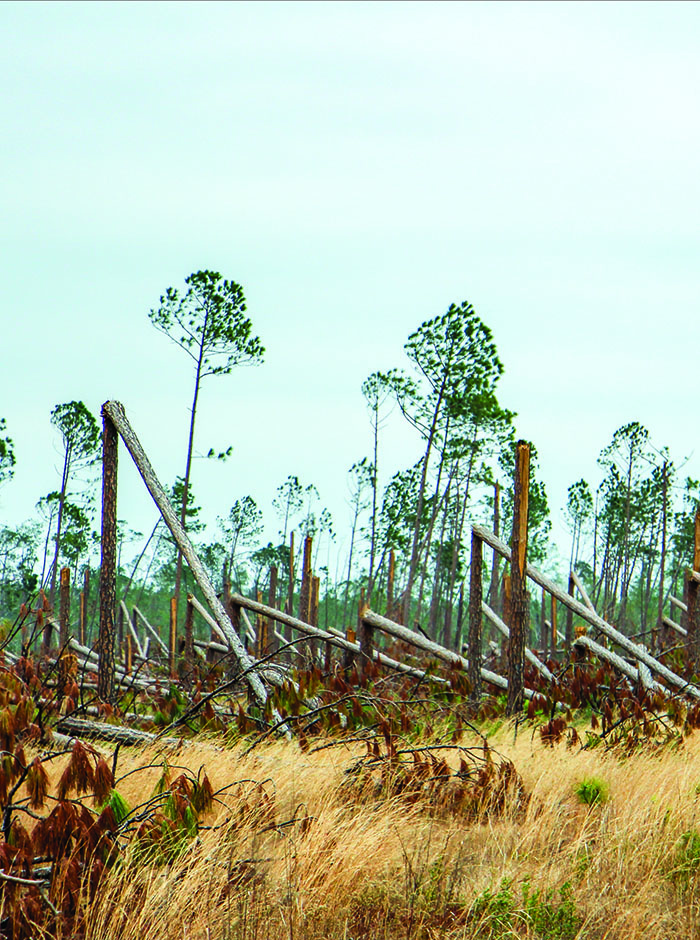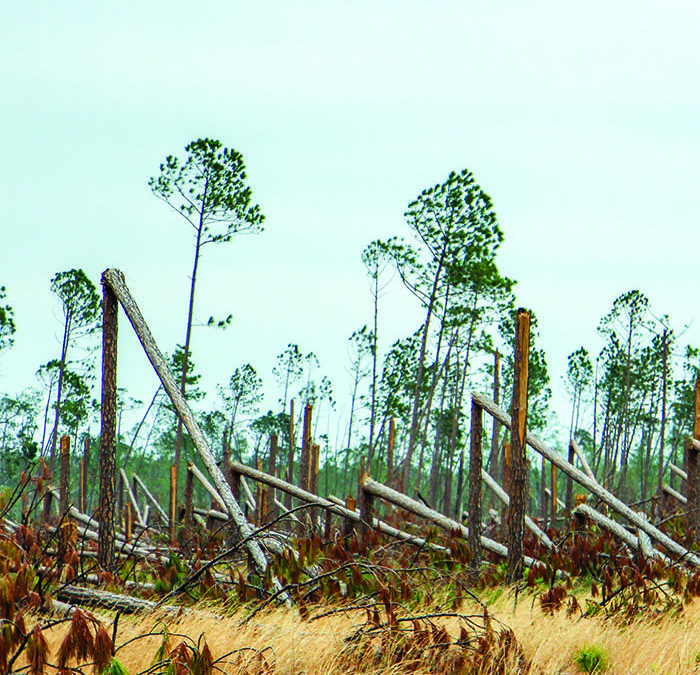Article by Jessica Johnson
Managing Editor
 After seeing the devastation for myself, I don’t know where to start: I spent three and a half hours riding around the cities of Lynn Haven and Panama City, Fla. and fought tears in January—90 days after the storm. When I met with Hayes Morris, logger and owner of timber dealership Morris Forest Products based in Lynn Haven, Fla., he told me it was looking good compared to what it was like “post storm day seven” when he was finally able to get out and assess damage outside of his own street. That’s how he speaks of the days following October 10: “post storm day seven…post storm day two…post storm day 45.”
After seeing the devastation for myself, I don’t know where to start: I spent three and a half hours riding around the cities of Lynn Haven and Panama City, Fla. and fought tears in January—90 days after the storm. When I met with Hayes Morris, logger and owner of timber dealership Morris Forest Products based in Lynn Haven, Fla., he told me it was looking good compared to what it was like “post storm day seven” when he was finally able to get out and assess damage outside of his own street. That’s how he speaks of the days following October 10: “post storm day seven…post storm day two…post storm day 45.”
The storm came ashore at Mexico Beach, maintained strength and barreled right through the town, county and region Morris has known (and worked) his entire life, leaving a 40-mile swath of destruction in its wake. Morris says he doesn’t know of a single building that didn’t sustain some sort of damage. His father, who lives farther up from Morris’ home in Bay County in Jackson County closer to the Alabama line, had a barn in a pond on his property until mid-January when Morris could get one of his excavators over to fish it out.
“A lot of people are just going to take the insurance settlement and walk away,” Morris explains. The cost of rebuilding and the lack of jobs in the area from those business that are now piles of debris as well will be insurmountable for many.
“People are just leaving and you can’t blame them,” Morris tells me, and I honestly agree. Michael ripped a path so vast that most of the homes are rendered uninhabitable. Insurance claims are slow to process and while everyone is dealing with their personal losses, businesses in the disaster zone are also trying to fight their way back.
I visited with a chain saw dealer—the only one in the area who is still currently open as he was blessedly on the beach side of the storm and therefore basically untouched damage-wise—who explained that while he can’t keep saws in stock, he can also see where tree guys, loggers and landscape crews have been completely gutted by workers leaving.
The storm drastically disrupted everyday lives and the rhythms surrounding them: A shipment overnighted via any of the carriers is at best a crapshoot. The post office has a little trailer set up in its parking lot to help customers. Walgreens is dispensing medicine in the parking lot under a tent with a trailer. There are countless places like that. It’s all like that—still.
I asked Morris how long it took him to wrap his brain around everything. His response? “Get back to me. I haven’t totally wrapped my brain around it. I was completely and utterly shell shocked for about three weeks.”
He says he thinks every day about how to deal with the community’s complete and total infrastructure collapse.
The sights in cities and towns are disarming, but the woods are downright Biblical. It is quite literally impossible to find a spot that doesn’t have a widow maker. Morris notes that there just aren’t enough people who can come and cut them all down.
His crews aren’t having trouble finding something to do. The difficulty is finding something that fits the product specifications the logger wants to pursue that has enough diameter to make it worthwhile. Unfortunately, the bulk of juvenile timber in the area has all blown down and can’t be sorted. And it will break when picked up.
Morris says he’s tried to take care of traditional customers, though in many cases he’s helping smaller, private landowners. “A little old lady in Jackson County with 80 acres, that’s all she has. That’s her retirement. So, we’ve been hopping from private to private,” he tells me with a little bit of pride in his voice.
Helping the smaller landowners is sort of like helping his neighbors. It is important to him and to the community. “I’m just trying to help those I can get to quickest. A lot of it is mobilization; I don’t want to spend a lot of time moving way over there, when I’ve got a landowner right here,” he adds.
The disaster is forcing many to take a hard look at their circumstances and futures and make some tough decisions. “This guy that works for me who lost his house and has to rebuild, he needs a job—bad. Real bad,” Morris says.
Meanwhile, the same dynamics are taking place across other industries and businesses. “If (people) lose their jobs right now, a lot of them are going to pack up and leave,” Morris explains.
Long term, Morris thinks his crews will cut hardwood for some of the landowners in Jackson County because he can always haul hardwood to GP in Cedar Springs, Ga. and Brewton, Ala. and be out of the way. Morris believes that once the pine deteriorates he’ll go back to hardwood. He tells me he feels like the hardwood is going to last a lot longer than the pine.
He has a home in hardwood that many loggers don’t—but good hardwood tracts here are wet and won’t be a viable alternative for most loggers.
Morris believes people aren’t putting the focus on timber because it’s too difficult to do. With timber, the money is okay in some cases, but it’s not as fast as going to a person with five acres of wood, debris and stumps and telling them, “Give me $10,000 and we’ll clear it for you with two employees and two machines.”
Morris is concerned about landowners replanting. He told me he wasn’t sure if more than 10% of the 1.9 million acres would be salvaged. Roughly 50% of those 1.9 million acres are completely devastated, and most are small landowners. If they don’t replant they are probably not going to clean it up, which will be a biomass nightmare in the short term that could create a biomass bonanza in 15-20 years.
Florida needs help in so many ways. Morris would love to talk to anyone who thinks they might have an idea (good, bad or ugly) to keep this acreage from literally going up in smoke. Please, reach out to him at morristimberco@comcast.net. And please, remember them in your prayers, the entire community is #850strong, but they still have a long way to go.

